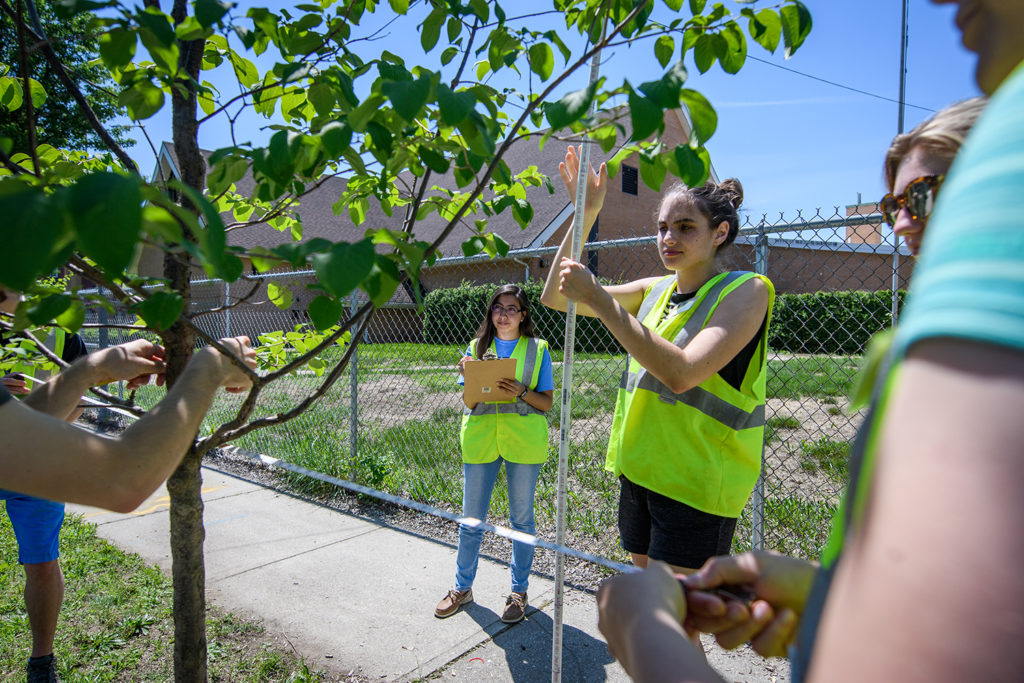Yeannet Ruiz ’19 finds the perfect storm for her geography skills

She hasn’t graduated yet, but Yeannet Ruiz already knows how she wants to apply what she’s learned at Clark University. After receiving her degree on May 19, she plans to return home to Houston to help with the city’s ongoing recovery from 2017’s Hurricane Harvey, one of the most devastating and costliest natural disasters in U.S. history.
“I have come to realize that my home is where I belong. The community I have in Houston so strong,” Ruiz says. “Hurricane Harvey affected historically disadvantaged communities, and there is still a lot of work to be done. I want my skills to serve the community.”
A first-generation college student, Ruiz enrolled at Clark via EMERGE, a Houston-based college access program for underserved communities. Clark provided her with financial aid.
Like a lot of high school students, Ruiz didn’t know much about college-level research — but at Clark, she has been able to experience it firsthand.
A geography major, Ruiz won a HERO (Human-Environment Regional Observatory) Fellowship for 2018-19. Overseen by Clark’s Graduate School of Geography, the competitive program provides the opportunity for a cohort of undergraduates to conduct research with faculty and doctoral students on how humans are affecting the environment.
“Doing research has been a big accomplishment for me,” Ruiz says. “It broadened my academic knowledge and allowed me to see how my skills could be applied to real-world problems,” Ruiz says.
Previously, she interviewed residents as part of a University of Texas study on the health impacts of metal recycling facilities in Houston. That experience came in handy for her HERO fellowship; working with geography professors Deborah Martin and John Rogan, as well as two doctoral students, to examine the vitality of trees in Chicopee and Fall River, Massachusetts, she interviewed residents to measure the success of the state’s Greening the Gateway Cities Program. The program aims to increase tree canopy by 10 percent in high-density neighborhoods by providing residents with trees and planting them along city streets.

In July, the HERO fellows shared their research in an hour-long presentation to a roomful of stakeholders from the Massachusetts Department of Conservation and Recreation, U.S. Department of Agriculture, Worcester Tree Initiative, and community members.
This spring, Ruiz completed an honors thesis based on data collected during her HERO fellowship and presented her findings at Clark’s Academic Spree Day.
All of her experiences at Clark have confirmed for Ruiz that she chose the right major. “I decided geography was the right fit for me because it encompasses my interest in science and the environment,” she says. “It is such an interdisciplinary discipline; geography offers many career options.”
Her projects have given Ruiz plenty of opportunities to apply what she’s learned in her chosen geography subfield, geographic information science (GIS). GIS researchers use satellite (remote sensing) data, spatial analysis, and other computational techniques in their work.
Throughout her time at Clark, Ruiz has been inspired by her adviser, geography professor Florencia Sangermano, a fellow Latina.
“It is inspiring to see representation and to know that it is possible to achieve my goals,” Ruiz says. “Professor Sangermano is very supportive of what her students want to do.”
Now that she’s headed back home to Houston, Ruiz is ready to apply her newfound knowledge and skills.
“I hope to work on initiatives similar to the Greening the Gateway Cities Program,” she says. “Houston is a place that could benefit from an increased tree canopy to help with stormwater drainage — something that was clearly lacking when Hurricane Harvey hit.”


